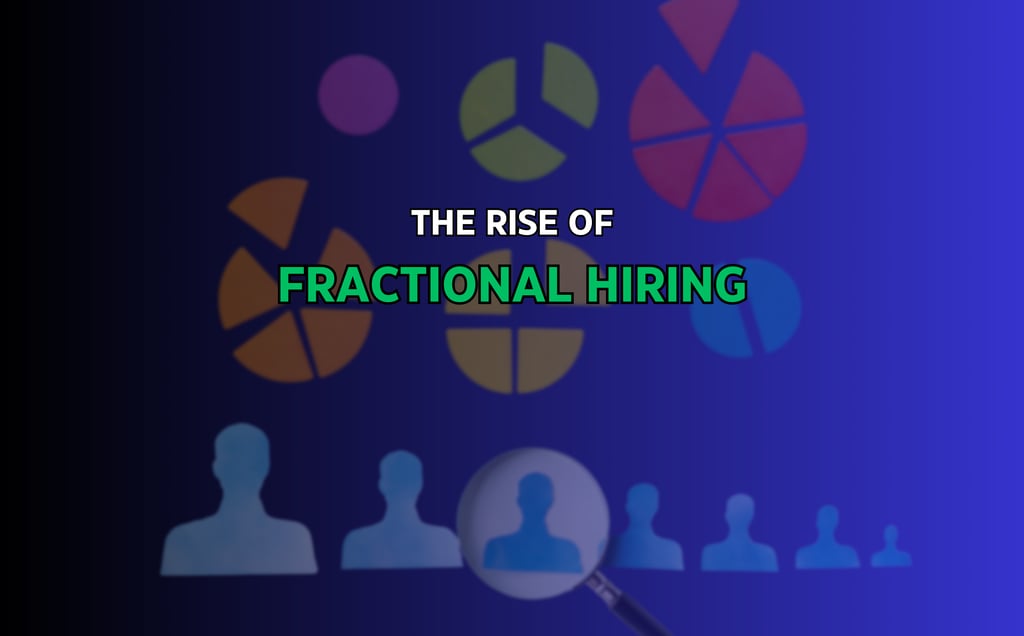Your Next Chapter Starts Here
The Rise of Fractional Hiring
A Flexible Approach to Expertise
10/2/20253 min read


The way we work is evolving at an unprecedented pace. Traditional, full-time employment remains the backbone of many organisations, but new models are reshaping the workforce landscape. One of the most significant shifts gaining momentum is fractional hiring — engaging highly skilled professionals on a part-time, project-based, or advisory basis rather than employing them in permanent, full-time roles.
This approach is not just a passing trend; it reflects a fundamental change in how businesses and professionals view work, expertise, and flexibility.
Why businesses are embracing fractional hiring
In the past, organisations often felt compelled to create full-time positions even when they only required certain expertise for a few hours a week or during specific project phases. Fractional hiring eliminates this challenge by providing access to the right level of knowledge without the costs and commitments of a permanent role.
Consider a growing company that needs strategic financial oversight but cannot justify hiring a full-time Chief Financial Officer. Through fractional hiring, they can bring in a CFO-level professional for one or two days a week, ensuring access to senior expertise without stretching resources. The same principle applies across disciplines such as HR, IT, marketing, compliance, and operations.
For smaller businesses and start-ups, this model can be game-changing. It allows them to access skills usually reserved for larger corporations, levelling the playing field and giving them a stronger foundation for growth.
Cost-efficiency without compromise
Recruitment, training, salaries, and employee benefits can make hiring senior professionals a substantial investment. Fractional hiring allows organisations to reduce these costs significantly while still benefiting from high-calibre expertise. Rather than compromising on quality by hiring someone less experienced, companies can secure the exact expertise they need — only for the time required.
This approach also ensures that businesses avoid “over-hiring” — bringing in permanent staff whose skills are not fully utilised. Instead, they can allocate resources with precision, improving both efficiency and financial sustainability.
Flexibility in uncertain times
The modern business environment is marked by rapid change. Market conditions, client demands, and economic pressures can shift quickly, leaving organisations struggling to adapt with a rigid workforce structure. Fractional hiring provides much-needed agility.
Companies can scale up during busy or transformative periods — such as product launches, expansions, or restructures — and scale down when projects are completed. This responsiveness reduces risk and ensures that organisations remain resilient even in uncertain times.
A win for professionals, too
Fractional hiring doesn’t just benefit organisations; it also offers a wealth of advantages to professionals. Many seasoned experts seek flexibility, variety, and autonomy in their careers. Fractional roles enable them to:
Share their knowledge across multiple organisations.
Balance professional commitments with personal priorities.
Pursue portfolio careers where they apply their expertise in diverse industries.
Stay engaged and relevant without the constraints of traditional employment.
For experienced professionals who may not wish to commit to the demands of a full-time executive role, fractional opportunities provide an ideal balance. It allows them to remain influential, impactful, and challenged while enjoying greater control over their time.
Bridging skills gaps effectively
Skills shortages continue to affect many industries, from technology to healthcare. Fractional hiring provides a practical solution by allowing businesses to access talent that might otherwise be out of reach. Instead of competing for scarce, full-time hires, organisations can bring in fractional experts to fill critical gaps, mentor teams, and transfer knowledge.
This approach not only addresses immediate needs but also helps build internal capability. Fractional professionals often act as advisors or mentors, equipping in-house staff with new skills and perspectives that continue to benefit the organisation long after their engagement ends.
A shift in the definition of employment
Fractional hiring reflects a broader cultural change: a move away from rigid employment structures towards more fluid, dynamic arrangements. Work is increasingly defined not by set hours or job titles but by outcomes and impact.
As more businesses embrace this model, the workforce is becoming more diverse and collaborative. It allows organisations to build teams that are precisely tailored to their needs, blending permanent employees with fractional specialists, contractors, and consultants. This hybrid approach to staffing creates a more adaptable and innovative business environment.
Challenges to consider
While fractional hiring brings many benefits, it is not without challenges. Organisations need to:
Ensure clear communication and alignment of expectations.
Integrate fractional professionals effectively into existing teams.
Manage confidentiality, contracts, and compliance carefully.
Build long-term relationships with trusted professionals for consistency.
By addressing these challenges proactively, businesses can fully unlock the potential of fractional hiring.
The bigger picture
Fractional hiring is more than a cost-saving tactic; it represents a strategic shift in how organisations access expertise. For employers, it delivers flexibility, efficiency, and high-level capability. For professionals, it offers freedom, variety, and fulfilment.
As the world of work continues to evolve, fractional hiring is likely to become an increasingly mainstream solution. It provides a model where both organisations and individuals thrive — shaping a future where talent is deployed more intelligently, careers are more flexible, and opportunities are more accessible.
AMR Global
Global leaders trust our search and selection expertise.
Reach out to us on
+44 7709 869 000
AMR Global © 2025. All rights reserved.


